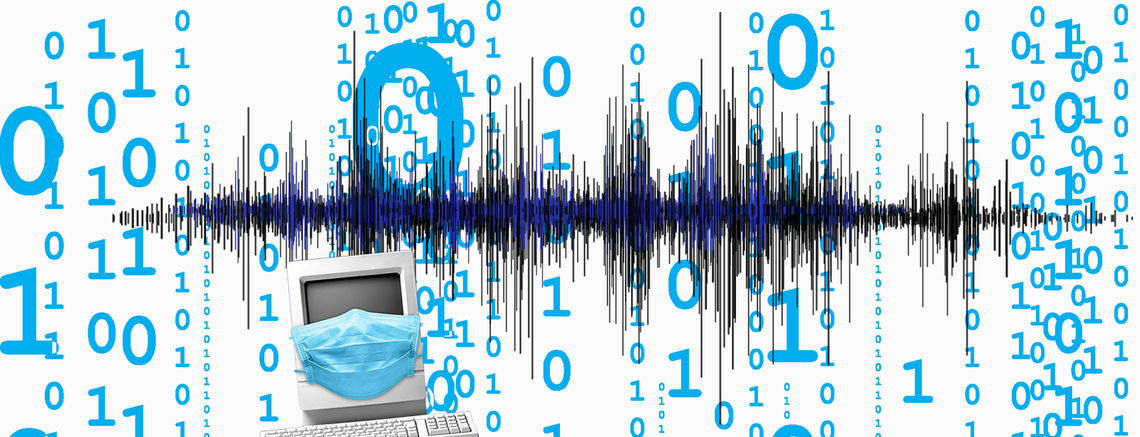Sun Apr 19 2020 · 9 min read
Scaling Up: These Five Armenian Tech Companies Are Making Pandemic Life a Little Easier

By Tatev Mkrtumyan

While most countries have gone into lock down and as many businesses have been forced to close, several industries have been able to keep operations afloat by shifting online and transitioning to remote work. Moreover, some of them have scaled or tapped into new markets during the pandemic. They are mostly tech startups or IT enterprises like Zoom, an online-conferencing app, whose user base has exploded over the past month. Another product that has gained mass attention, recording 700% user growth, was Krisp, a noise-canceling app created in Armenia.
Here are five startups from the Armenian tech scene that are making a splash in four main industries that are growing during the pandemic: remote work technology, education technology, entertainment, and SaaS (software as a service). Their founders introduced the state of their industry and presented how they are adapting to the changes in the economy as they scale.
Remote Work Technology: Krisp
The numbers of remote workers worldwide has skyrocketed over the last month. Hence, the first tech products to benefit during this period are those targeting remote workers, like Krisp. “Our industry boosted during quarantine and the numbers of remote workers grew 100 times, which impacted our startup as well,” said Artavazd Minasyan, one of the co-founders.
Krisp was featured in Forbes, The Washington Post and The Wall Street Journal as one of the essential tech products for working from home. They had ten times as many downloads in March than February. Krisp also released its app for Windows users and launched a Chrome extension for the first time. As Minasyan said, they’re now working on new solutions and features. “Now, when remote work technologies are demanded more than ever, several b2b [business to business] partnership processes also go faster and smoother,” adds Minasyan. He announced that a leading chat messenger service - Discord - integrated Krisp to ensure noise-free calls for their users. Minasyan added that they’re now holding negotiations with more global brands, a level of engagement that was not possible before demand exploded.
While these positive effects are more visible and attention-grabbing, there are downsides as well. Regardless of the continuous growth of the user base, liquidity is also decreasing as people become more cost-sensitive these days. For this reason, Krisp decreased the prices of their plans by 30% and made a special offer for the Armenian market: they can get six months of access to the paid plan for free.
Although the startup is benefiting from the pandemic, with new partnership plans and app features, they are making sure to keep their growth sustainable even after companies revert to their old routines. “Both employees and employers now understand the value of our technology and remote work in general, and I think that Krisp will be a part of their regular toolset, even after this pandemic,” sums up Minasyan.
Education Technology: LiveBoard
Digital education has usually been a controversial topic for the fear that it may harm distracted children and teenagers by hooking them even more to their devices. Now, it’s more prioritized and valued, regardless of prior viewpoints. “I think this industry takes the third place today with its demand and importance after the health and remote work industry,” expressed Yerem Khalatyan, one of the co-founders of LiveBoard, an online whiteboard for tutors and students. “There are two types of startups: vitamins and painkillers,” Khalatyan continued. “Before this, people considered most of the ed-tech solutions like ours as vitamins; they are nice to have add-ons but do not have a vital role. Now, they’ve become pain-killers, solving a common problem for the world: distance teaching and learning.”
Everything started unexpectedly when the LiveBoard team woke up on March 10 and saw that Italy had taken over their user map. App downloads increased by 20 times in 2-3 days by users from all around the world. In March, it had 10 times as many downloads than the past year. The customer support team is receiving up to 70 reviews and feedback submissions daily, which help the team to improve the product faster and make it more customer-centric. “Our mobile-first approach has been a key for our business growth and now, in these hard times, it gives us a more competitive advantage. We needed four years to reach 500,000 users. Now I think we’ll hit 1 million users by the end of this year,” Khalatyan said.
For LiveBoard, this rich and diverse customer feedback helped the team to understand and prioritize their product and business needs and act accordingly. “First of all, we never had so many users and didn’t expect it that shortly, so our first challenge was to solve our server issues. Now, we’re ready for even more load. Secondly, with the growing number of new users from different regions, we noticed a demand for multi-language tutorials,” Khalatyan highlighted. “Even one of our users from Germany suggested her help in translating the whole app. Third, we realized that we need to rethink our marketing model and payment plans to make the app available for more segments with more affordable prices. Finally, we improve 1-2 features weekly based on the requests we get from our users, and this accelerated load helps us to prioritize their demands better.”
Education Technology: Dasaran.am
Another Armenian ed-tech product, Dasaran.am, a school management platform, has been among the pioneers of promoting digital education in Armenia for over 10 years. Suren Aloyan, the founder and CEO of Dasaran.am, mentioned that over 46% of teachers in Armenia are over 50 and it has always been a challenge for them to use digital technologies. He also thinks that such a challenging situation may bring us to an educational revolution because for the first time, teachers are now in a whole new situation. “They have to learn how to use digital technologies, to find new sources, new materials and many more that replace their traditional class processes now,” Aloyan explained. “It’s also the first time that teachers are self-organizing and taking a decentralized approach for decision-making, outrunning the regular centralized system.” This situation provided an opportunity for teachers to shift from the role of “ruler” to one of being a mentor for students. “I hope this tendency will continue even after quarantine and will bring reforms in our educational system,” he said.
Now, Dasaran.am’s main concentration is restoring the class process and increasing engagement on their platform. For this reason, they’ve launched and proceed to work on new product sections and features such as the “Daser” (classes) section. It’s a hub for online video courses created by the teachers or taken from other sources. These courses are available for all of the registered pupils in the given age group depending on the course material. Teachers can also create quizzes to evaluate the participation and learning outcomes of their classes. According to Aloyan, this helps in restoring the regular class process for 80-90% by inserting more interactive elements into the distance learning process. Teachers have created over 23,000 courses in a month, several of which have more than 24,000 views.
With this, Dasaran.am has been listed among world Top 100 best tech solutions providing distance learning opportunities during the COVID-19 pandemic. “Regardless of this devastating pandemic, I’m hopeful that this time of crisis will bring revolutionary changes and reforms in our education system, driving it forward when everything is over” Aloyan said.
Entertainment: Zoomerang
When most of the world is isolated in their homes, they need to find ways to keep themselves entertained. Social Media Today reports that people are spending 20% more time on apps during the COVID-19 lockdown. According to the same report, TikTok, a social media for short-form mobile videos, takes the top rank in downloads.
There is also an Armenian app named Zoomerang on the list of scaling products. It helps make creative TikTok and Instagram videos with step-by-step tutorials. “Before the pandemic, our users were active on the weekend mainly, since they’re mostly students and workers. Now every day is a weekend for us,” mentioned Davit Grigoryan, co-founder of Zoomerang.
"In only two weeks, we had 2 million new users. And currently, we have 350,000 daily active users at a minimum, instead of 200,000 (recorded during the past year)," added Grigoryan, highlighting that their team was ready for this load and traffic. Hence, this happened to be a test period for them. “Everybody’s at home and there’s not much to improvise or experiment with. That is why we're adding new features and effects and they proved to be the best performing ones so far.”
As an industry insight, Grigoryan explains that the boost to the entertainment industry is only short-term. Streaming services such as Netflix have had increased traffic so they decided to reduce video quality for smoother streaming. On the other hand, all productions and new releases have stopped and there’s been a drop in the amount of new content to be released during the fall or next year.
For this reason, video apps like Zoomerang and TikTok are increasing market share as their users continue to create new content for their platforms, which will keep them in-demand with a wider audience, even after the pandemic.
SaaS: Netris.ai (formerly XCloud networks)
In most of the examples above, the first technical issue encountered was related to increased network traffic, which caused problems with data servers on cloud data centers, such as Amazon Web Services (AWS). Such cloud data centers provide cost-effective and flexible access to scalable storage resources without owning a private data center, which takes more resources and expenses. However, with growing network traffic and big data, businesses need to buy new servers on cloud data centers, spending more and more. This means that even if the number of users grows, extra costs will be incurred by the business to ensure adequate network performance.
“With the expansion of a company, the bills for public cloud data centers may reach up to $100 million, making it necessary to create a private data center, which is hard and time-consuming and requires special expertise. Our software helps to replace that traditional process with our modern solution to help in ‘repatriating’ to a private network by creating a similar user experience on private data centers,” explained the co-founder CEO of Netris.ai (formerly XCloud networks) Alex Saroyan, who has over 20 years of experience in network infrastructure and is the former Head of Core Network at Ucom, one of the main Armenian telecommunications companies.
Fortunately, industries like entertainment, remote work, ed-tech, e-commerce or any other online area record dramatic growth during this period and many of them think about improving their infrastructure. That’s where this software solution can be considered. “In times of economic recession, almost all companies start to prioritize the operational efficiency of their businesses and our product aims to improve operational efficiency. They become cost-sensitive now and it increases cloud repatriation, which benefits our business,” explained Saroyan.
On the other hand, Netris.ai is an enterprise product that requires budgets and long-term planning for at least six months, and most of the companies today don’t know what’s awaiting their business, which makes it harder to increase new sales. Nevertheless, it’s much easier to explain the importance of this product for businesses since they’ve already encountered the problem very closely nowadays. “We have current clients from these industries and most of them have a positive effect on their business and consider re-signing new contracts for improving their infrastructure to handle larger traffic,” mentioned Saroyan, bringing an example of one of their major clients who they helped to cut enormous costs saving $30 million for a team of 100 members, which made a significant difference for their company.
Shortly, although it’s much harder for enterprise companies to acquire new clients, it’s the right time for them to raise awareness of their solution, touching on a common problem that most online businesses face nowadays.
To conclude, such times of crisis can both destroy and scale businesses. They can not only help companies and startups to find their product-market fit, find new opportunities and even build new products but also filter the business map, leaving those who are strong enough to survive and grow. This may help VC funds to invest more rationally and may help founders rethink and learn. After all, we’re all in an acceleration program; the question is “Who will be the final graduates?” Hopefully, the chances of having winners from the Armenian tech scene are high.
also read
Armenian Startups in Deep Tech: How Krisp is Breaking New Ground
By Tatev Mkrtumyan
Deep tech startups are built on scientific and engineering discoveries and innovations. In the Armenian startup ecosystem, there are only a handful of deep tech startups. One of them is Krisp.
Placing Armenia on the Global Tech Map
By Tatev Mkrtumyan
Armenia’s Information and Communication Technologies sector has been steadily growing over the past decade. Tatev Mkrtumyan focuses on three spheres that will impact Armenian hi-tech industries and place it on the global tech map.
COVID-19
Distance Education in Times of Coronavirus
By Narek Manukyan
Educational institutions around the world are moving to online learning as the COVID-19 pandemic wreaks havoc. Narek Manukyan examines the Armenian education system’s preparedness for distance learning following the government’s announcement of a one-month state of emergency in the country.
Information Technologies and General Education in Armenia
By Narek Manukyan
Different forms of distance learning have been introduced in Armenia for three weeks now. What do we know about the use of information and communication technologies in the general education system of Armenia?
Armenia After COVID-19: Catching Up Faster
By Samson Avetian
What will change after the global COVID-19 pandemic and how can Armenia position itself to come out of the crisis in a stronger position? Samson Avetian breaks down the economic landscape.








EVN Report welcomes comments that contribute to a healthy discussion and spur an informed debate. All comments will be moderated, thereby any post that includes hate speech, profanity or personal attacks will not be published.